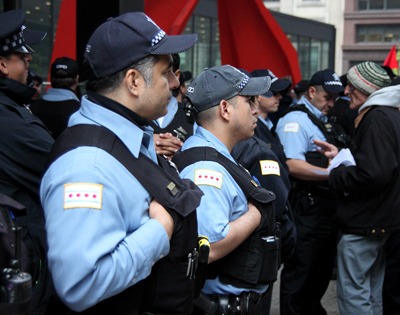As police departments nationwide, including the Chicago Police Department, move swiftly to adopt body cameras to record interactions between officers and civilians, we should pause. It would be unwise to deploy this new technology without instituting some basic privacy protections for the man on the street.
If we don't, police body cameras may devolve into yet another tool for routine surveillance of the public, not oversight of the police.
A body camera placed on an officer's vest, headwear or even sunglasses raises the reality that recordings could take place in areas where people have a high expectation of privacy, like homes or apartments. That potential level of intrusion requires that civilians know their conversation with police is being recorded and stored. When an officer records a conversation with civilians, he or she should notify them that a recording is occurring. When an officer is not in uniform, it is crucial that he or she self-identify as a police officer and provide notice of the recording.
The next critical point is determining which conversations are recorded. If police officers are the final arbiters in deciding to activate a body camera, they may not capture interactions that result in the use of force.
Some have suggested recording an officer's entire shift, bathroom breaks and all. This is unfair. But it points to the need for a bright line for recording so that we can achieve the oversight and accountability expected by the public.
The best approach is to require officers to record every interaction with a civilian. The only exception to this policy should be for First Amendment activity (e.g., a protest, demonstration or rally), which should not be captured and cataloged by police. This activity should not be recorded — absent some reasonable suspicion of criminal behavior.
This standard means capturing a lot of data, from stop-and-frisk searches to tourists seeking directions. Concern about collecting this many recordings can be mitigated by regulating how this data is retained and distributed.
Recordings should be retained no more than 90 days, unless the encounter has been flagged — an instance in which force is used, a detention or arrest results, a formal or informal complaint is filed or because a supervisor holds it for internal training purposes.
Individuals recorded by police officers should have access to recordings pertaining to their incident. Flagged recordings should be released to the pu blic on request. Any recording not flagged should not be disclosed. Finally, no recordings should be disclosed to other government agencies unless a supervisor determines they are relevant to an ongoing investigation or contain evidence of criminal activity.
With these simple protections, body cameras can provide critical insight into the way law enforcement officers interact with civilians each day, while also protecting personal privacy. Rarely do we have the opportunity to make certain that critical privacy policies are in place before we begin to use new technologies. But we need to take this opportunity now, and get it right.

